Birmingham City Council HMO renewal fees increase by up to 225%
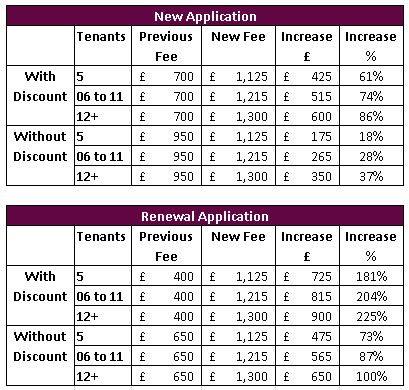
Without prior announcement or consultation, Birmingham City Council (BCC) have increased their HMO application and renewal fees by as much as 225% as of 1st April 2022.
Mandatory HMO licence fees up to 31st March 2022 were:
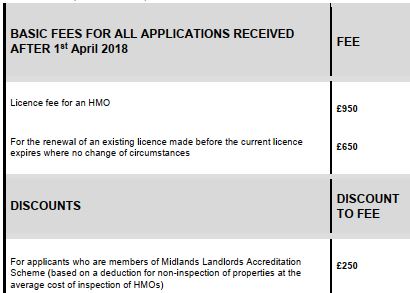
Fees from 1st April 2022 are:

The changes for different types of application are in the image at the top of this article. New applications increased between 61% and 86% and renewal applications have increased from between 181% and 225% if the landlord previously benefited from the MLAS discount of £250 per application.
MLAS/NLA/RLA Discount
A significant benefit of being part of the Midland Landlord Accreditation Scheme (MLAS) and completing the Continuous Professional Development (CPD) courses, was the discount available for landlords when completing their HMO applications. Now the discount has been removed (without any announcement from the MLAS or BCC) landlords will have reduced incentives to continue their membership with the MLAS which could result in landlords being less informed and less qualified.
The MLAS was asked to submit any comments to BCC but did not respond ” MLAS was asked to submit any comments they wished to make in response to this email 4 January 2022. No comments have been received.”
Prior to 2018 discounts for both the NLA/RLA and MLAS were applied by BCC, totalling £450. At that point, a renewal fee was £850, and just £400 after both discounts applied.
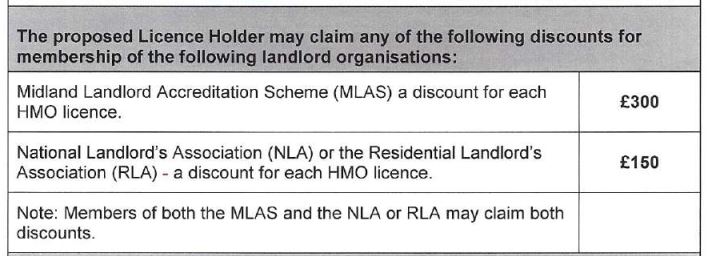
Part A and Part B
You’ll notice that HMO fees are now split into part A and part B, due to case law set by R (Hemming and Others) vs Westminster City Council.
What does the council say?
BCC published a report on it’s website (not as part of a press release, and only accessible through Google) dated 9th March 2022 setting out the reasoning for the increase in fees.
“The mandatory HMO licensing scheme is a ring-fenced account and therefore must meet any and all expenditure from within its own income. The level of income is entirely dependent upon the number of licences applied for, issued or renewed in a particular year.”
” It is also acknowledged that since 2019/20, 2020/21 and 2021/22 there has been a backlog of licence applications due to insufficient staffing caused by budget constraints related to the fee level The proposed fees are further influenced by the introduction of a new process for determining licences from 2022/23 that will include a pre licence inspection.”
” The legal requirement for a Licensing Service to recover only “reasonable costs” takes precedence over the City Council’s Corporate Charging Policy and the requirement to maximise income. License fees prescribed by statute also take precedence over the Corporate Charging Policy.”
” There will no longer be a reduction in the overall cost of licence (application fee and licence fee) for membership of the Midland Landlord Accreditation Scheme. This because being a member of this scheme does not reduce the time spent in determining applications and administering the scheme to its members. Therefore, any fee reduction would result in a shortfall the income required to deliver the licensing scheme.”
“There is no separate fee proposed for renewals as the time spent assessing renewal applications and administering the licence scheme for renewals is the same as that spent for any new licence application.”
” It is acknowledged that there is a considerable increase in the cost of an mandatory HMO licence, but this increase will enable the Council to ensure that it is meeting its obligations and duties in relation to processing licences within a reasonable timeframe and carrying out the appropriate inspections to ensure that the conditions of the licence are complied with and that the standard and safety of remises is at the required level. It also enables the scheme to identify premises that are operating illegally and bring them into the scheme using appropriate enforcement powers.”
” On 17 December 2021 the Head of Licensing wrote (by email) to the Midland Landlord Accreditation Scheme (MLAS) and informed them that Birmingham City Council’s was reviewing the fees related to mandatory HMOs. The correspondence detailed the issues that had previously been considered in relation to the current reduction in fees for MLAS members and clarified that the review could not establish how being a member of MLAS would result in a time saving in terms of administration of the licensing scheme for MLAS members. It would not therefore be appropriate to offer a fee reduction to MLAS member in respect of mandatory HMO licensing fees.”
How does it compare to other Local Authorities (LA)
There are over 300 LA’s in England so I’ve selected a few which have large numbers of HMO properties, similar to Birmingham City Council for comparison.
Each LA has a different fee structure from the next, some charging varying amounts based on the number of occupants, some providing discounts for applications received on time etc so I have calculated the fee based on a seven person HMO.
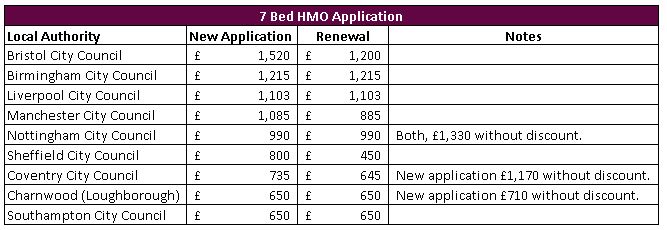
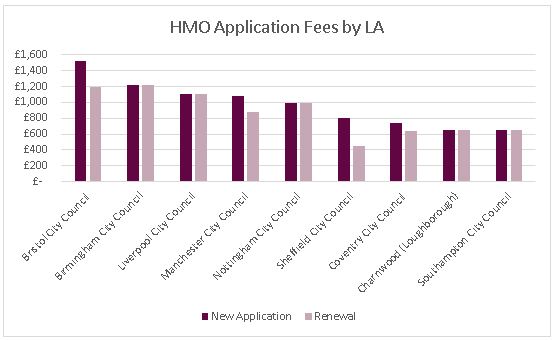
Comment
The last time BCC increased HMO application fees was 2018, so the increase is over due, which is probably why the increase has been so sharp. The “Chief Officers, at least annually, report to and seek approval from Committee on a review of all fees and charges levied for services provided.” and BCC acknowledges that “since 2019/20, 2020/21 and 2021/22 there has been a backlog of licence applications due to insufficient staffing caused by budget constraints related to the fee level.”, so why didn’t the annual reviews since 2019 suggest an increase in the fee level?
Whilst the fee increase is very steep it is not the highest new application fee I’ve found whilst researching, but it is certainly the highest renewal fee.
Many landlords will be disappointed after having many hours of their time and money on attending CPD classes with the MLAS over the last five years, only to be told that their discount no longer applies. BCC may end up dealing with more complaints about substandard properties because they have removed the incentives for landlords to be better qualified and educated in looking after their HMO properties.
It seems counter intuitive that it takes the same amount of resource to process a renewal application as a new application, “the time spent assessing renewal applications and administering the licence scheme for renewals is the same as that spent for any new licence application”, but without detailed knowledge of the administration process it’s hard to say for certain.
It is also very difficult to judge if the cost of processing applications when there is no published data (that I can find), about the income and expenses of the HMO licencing team; it does however seem off that some LA’s are able to carry out the same work for half the cost (Coventry, Charnwood and Southampton, all listed in the table above). If the online application portal which landlords are expected to use is anything to go by to assess the internal software used by BCC, I suspect there is a great deal of scope for improving efficiency and limiting cost to landlords.
Whilst the report says that BCC must only “recover only “reasonable costs””, which is the same situation for all LA’s, there is no mention of what steps are taken to ensure costs are kept low; there don’t appear to be any incentives for LA’s to make efficiencies and bring down costs. How can it cost Sheffield City Council £450 to process a renewal application, and BCC £1,215?
All local authorities also have to deal with a fluctuation in applications and renewals received; Mandatory licensing of HMOs came into force in 2007, which is when many HMO properties will have received their first licence, this results in a spike in renewal applications every five years. The table below shows the number of licences starting in each year for the last five years, data from BCC website. The number of applications per year ranges from 192 to 1441 in 2021 which is an increase of 650% from one year to the next. The BCC report took averages of data from four years, not five, and did not mention the impact on resources the fluctuation in applications has.
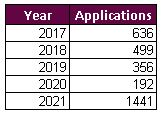
Further increase in costs are also being paid during the HMO application process when BCC are now requiring proof of C4 status for properties within the Article 4 area, more will follow on this shortly.
Links
Links to fee details for LA’s:
| Birmingham City Council | https://www.birmingham.gov.uk/downloads/file/1625/hmo_licence_fees |
| Bristol City Council | https://www.bristol.gov.uk/licences-permits/mandatory-houses-in-multiple-occupation-hmo-licence-fee |
| Nottingham City Council | https://www.nottinghamcity.gov.uk/media/3332933/ncc-licence-fee-policy-april-2021.pdf |
| Charnwood (Loughborough) | https://www.charnwood.gov.uk/pages/register_hmo_licences |
| Manchester City Council | https://www.manchester.gov.uk/downloads/download/5359/hmo-fees_and_additional_charges |
| Liverpool City Council | https://liverpool.gov.uk/business/licences-and-permits/landlord-licensing/houses-in-multiple-occupancy/apply-for-an-hmo-licence/ |
| Southampton City Council | https://www.southampton.gov.uk/housing/landlords/houses-multiple-occupation/licence-fees/ |
| Sheffield City Council | https://www.sheffield.gov.uk/home/housing/licensing-houses-in-multiple-occupation |
| Coventry City Council | https://www.coventry.gov.uk/housing-enforcement/hmo-licensing/9 |
